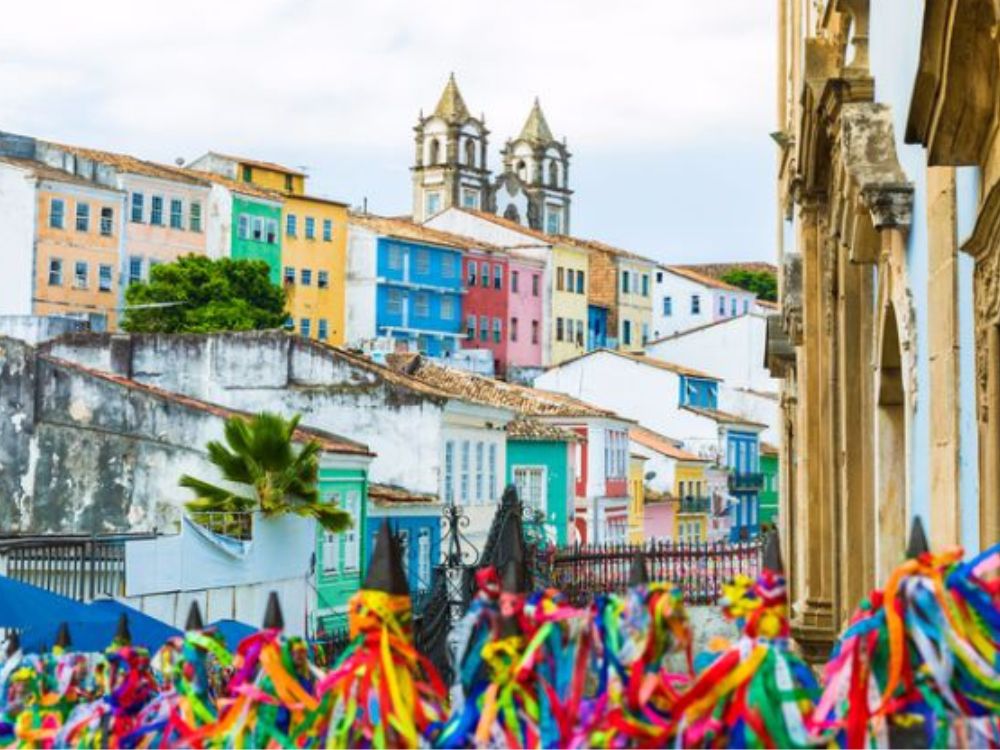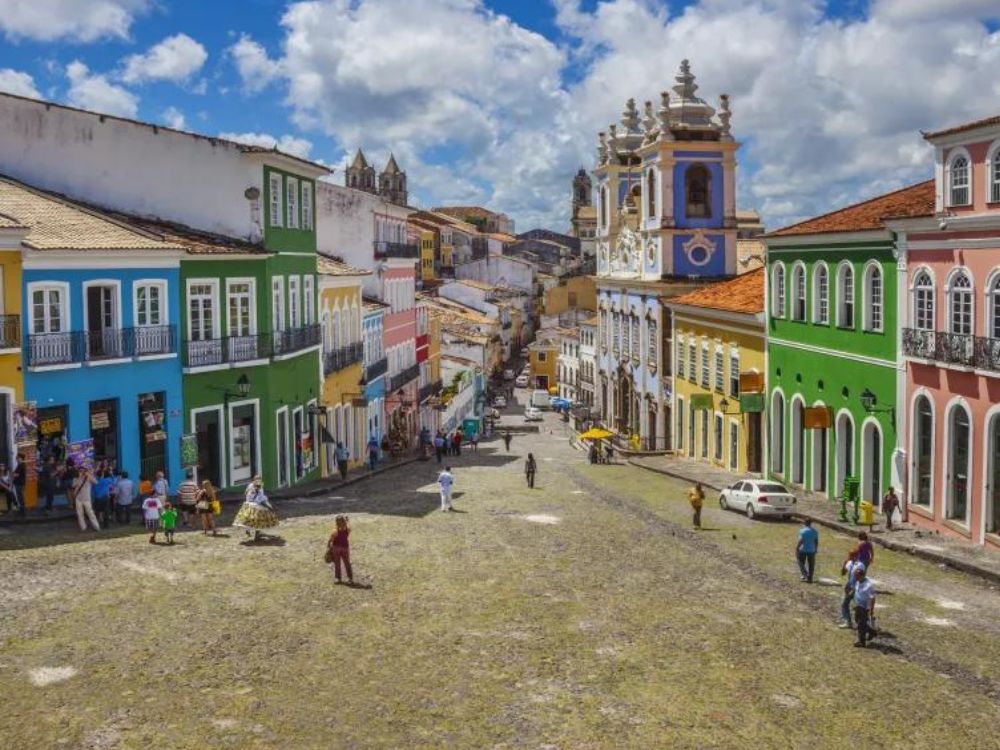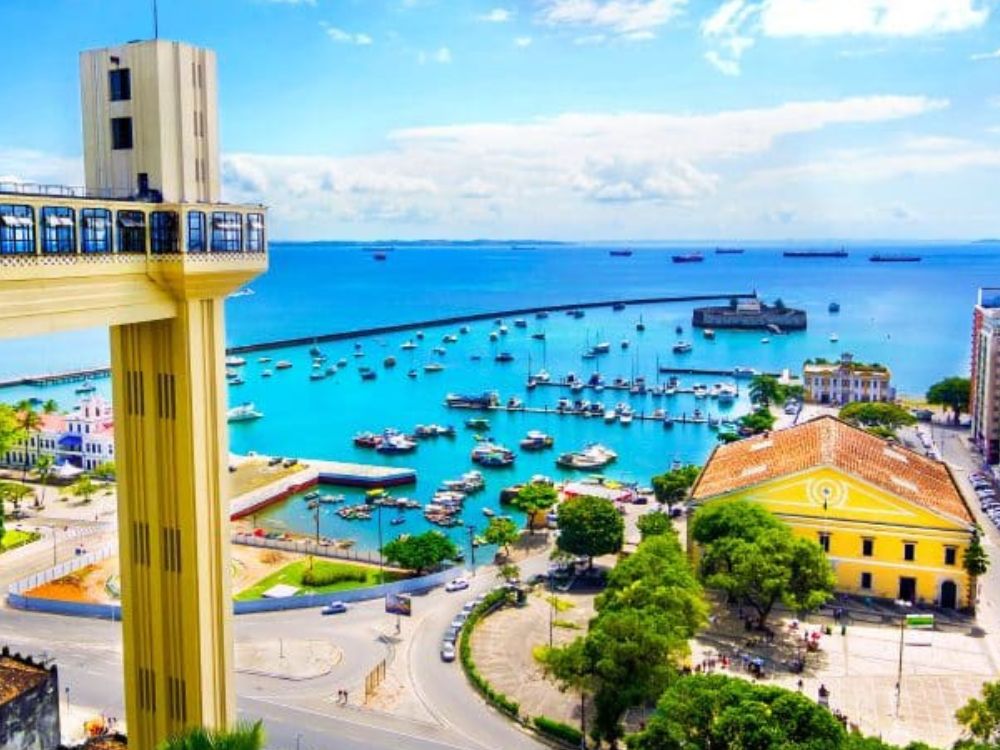
Welcome to Bahia, a state rich in history, vibrant culture, and stunning landscapes. Get ready to discover all the charms of this destination that is truly a cultural treasure of Brazil.
With a tropical climate, Bahia enjoys pleasant temperatures throughout the year, with averages ranging between 24°C and 32°C. These inviting weather conditions make Bahia a perfect destination for those seeking sun, warmth, and beaches.
With a population of over 14 million inhabitants, Bahia is the most populous state in the northeastern region of Brazil. Covering an area of approximately 560,000 km², Bahia is the fourth largest state in Brazil in terms of territorial extension.
This vast area is marked by an impressive variety of landscapes, ranging from paradisiacal beaches to forests and mountains.
The history of Bahia’s colonization is fascinating, beginning with the arrival of the Portuguese in Porto Seguro, ushering in an era of cultural wealth that still permeates the streets of its cities today.
Local customs are a spectacle in themselves, with capoeira and samba de roda echoing through the streets, while the aroma of acarajé and vatapá invites everyone to a unique gastronomic experience.
Traditional festivals and events are the beating heart of Bahia, with highlights including the Salvador Carnival, one of the most famous in the world, and the celebration of Iemanjá, which attract visitors from all over the planet.
Salvador, Ilhéus, and Itabuna are just a few of the important cities that make up Bahia’s urban mosaic, each with its unique identity and rich in history and culture.
The appearance of Bahian cities reflects its people: colorful, joyful, and welcoming.
From the Pelourinho in Salvador, with its colonial buildings and cobblestone streets, to the small fishing villages, every corner of Bahia has its own beauty waiting to be discovered.
Bahia’s historical journey is a captivating tale of discovery, conquest, and cultural fusion. The state played a pivotal role in Brazil’s colonial history, being one of the first regions settled by the Portuguese.
Porto Seguro is a historic site where Pedro Álvares Cabral first set foot in 1500, marking the beginning of Portuguese colonization. This historic event is celebrated and remembered through various monuments and museums that offer a glimpse into the past.
Salvador, the capital of Bahia, was the first capital of Brazil and remains a city steeped in history and tradition. The Pelourinho, a UNESCO World Heritage Site, is the historic heart of Salvador.
It is characterized by its colorful colonial architecture, baroque churches, and vibrant street life. Walking through its cobblestone streets feels like stepping back in time, with each building and square telling a story of the past.

Bahia’s culture is a vibrant blend of African, Indigenous, and Portuguese influences. This cultural melting pot is evident in the state’s music, dance, religion, and cuisine.
Capoeira, a martial art that combines elements of dance, acrobatics, and music, originated in Bahia and is a symbol of resistance and cultural pride. Samba de roda, another traditional dance, also hails from Bahia and is an integral part of local festivities.
The Salvador Carnival is an explosion of color, music, and joy. It is one of the largest and most famous carnivals in the world, attracting millions of visitors each year.
The celebration features massive street parades, live music, and dancing that lasts for days. Another significant event is the Festa de Iemanjá, held on February 2nd.
It is a celebration dedicated to Iemanjá, the Afro-Brazilian goddess of the sea. Devotees dress in white and offer flowers and gifts to the sea, creating a mesmerizing and spiritual spectacle.
Bahian cuisine is a feast for the senses, rich in flavors and traditions. The state’s culinary heritage is deeply influenced by African and Indigenous ingredients and cooking techniques.
Acarajé, one of Bahia’s most iconic dishes, is made from black-eyed peas, seasoned with onions and salt, and deep-fried in palm oil. It is typically filled with vatapá, a creamy paste made from shrimp, coconut milk, and spices, and served with hot sauce.
Moqueca, a flavorful fish stew cooked in a clay pot with coconut milk, tomatoes, onions, and cilantro, is another staple of Bahian cuisine.
Each bite reflects the state’s rich cultural tapestry and the abundance of fresh local ingredients. For those with a sweet tooth, Bahian desserts such as cocada (a coconut-based sweet) and quindim (a bright yellow dessert made from coconut, sugar, and egg yolks) are must-tries.
Bahia’s natural beauty is as diverse as its culture. The state’s coastline is dotted with some of the most beautiful beaches in Brazil.
Porto Seguro, with its golden sands and clear waters, is a popular destination for sunbathing and water sports. Praia do Forte, known for its sea turtle sanctuary, offers a unique opportunity to observe these magnificent creatures up close.
Chapada Diamantina, a national park located in the heart of Bahia, is a paradise for nature lovers and adventurers. The park is home to stunning waterfalls, caves, and hiking trails that offer breathtaking views of the surrounding landscapes.
The Fumaça Waterfall, one of the highest in Brazil, and the mysterious Blue Cave, where the water appears to glow an ethereal blue, are among the park’s highlights.

Bahia’s cities each offer a unique charm and character. Salvador, with its historic districts and vibrant arts scene, is a city of contrasts where the old meets the new. Ilhéus, known for its cacao plantations, is a city that inspired many of Jorge Amado’s novels, reflecting the literary richness of Bahia. Itabuna, another important city, is a hub of cultural and economic activities in the southern part of the state.
The Bahian way of life is characterized by a laid-back and joyful spirit. The people of Bahia are known for their friendliness and hospitality, making visitors feel at home.
Whether you are strolling through the bustling markets, enjoying a local festival, or relaxing on a beach, the warmth of the Bahian people is palpable.
In conclusion, Bahia is a state that embodies the soul of Brazil. Its rich history, vibrant culture, delicious cuisine, and stunning natural beauty make it a destination like no other.
Whether you are a history buff, a foodie, an adventure seeker, or simply looking to relax, Bahia has something for everyone. Come and experience the magic of Bahia, and let yourself be enchanted by this Brazilian state that is pure joy of living.
